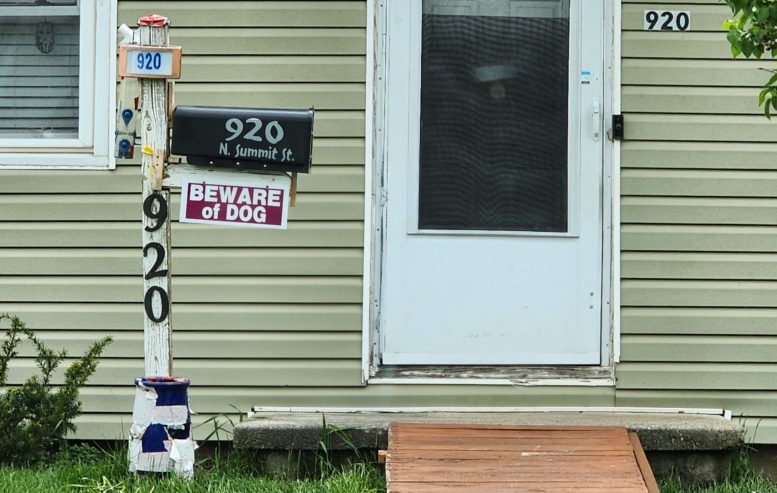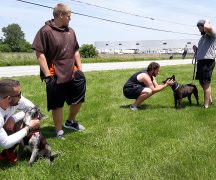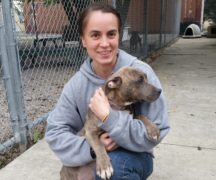By JAN LARSON McLAUGHLIN
BG Independent News
A Bowling Green couple’s dogs, declared to be “dangerous,” have bitten at least five people in the last nine months, according to local officials.
The police have responded 13 times for the pit bull mix dogs running loose, finding them as far away as Kramer Road south of Bowling Green. Officers have taken reports from people who have been bitten, and have cited the owners – Ray and Kelley Stevens at 920 N. Summit St. – for failure to confine their dogs.
The Wood County Dog Warden has responded eight times to apprehend the dogs as they were running loose.
“We have dealt with them multiple times,” Dog Warden Jodi Harding said earlier this week. “The dogs are strong and aggressive,” with two being deemed dangerous by Bowling Green Municipal Court.”
The owners have been cited in court 10 times, according to the dog warden. But they still aren’t complying with the rules set by the state for the handling of dangerous dogs. So Harding is working with the court to see if other steps can be taken to keep the dogs from harming people.
“We’re working with the courts to see if there is any more we can do,” Harding said.
When contacted this week, Ray Stevens said the dogs are “pitskys,” or mixes between pit bulls and huskies. The dogs used to jump the fence, but on Friday he said he believes that problem has been solved.
“They can’t any more. I fixed it,” Stevens said. He added that he is waiting for a city permit to build a privacy fence in the backyard to make the home more secure. As of this week, the backyard where the dogs have escaped from is a mix of wooden and cloth type barriers.

When asked how many dogs he has at the home, Stevens replied, “it doesn’t matter.” He said the dogs have received their rabies vaccinations, and that he has equipment at the house to microchip them.
In November, Kelley Stevens was cited for failing to confine her dogs after one reportedly bit a jogger five blocks from the Stevens’ home. Police arrived on the scene to find the jogger with a bite to his right lower leg. The jogger said two pit bulls began chasing him, then one bit him.
Police talked to a witness who was in a nearby van when the bite occurred. The witness said she saw the dogs swarm around the jogger, and she called police just as the jogger was bitten.
As officers were on that scene in the 400 block of North Summit Street, a dispatcher took another call that the dogs had bitten someone on Ridge Street near the campus.
Police called the county dog warden for assistance. The dog warden first went to the BGSU stadium to catch a third dog, also reportedly owned by the Stevens. Police located the other two dogs between the 300 blocks of North Prospect and North Main streets.
In March, the police responded to a report of a woman being bitten in the 300 block of Curtis Avenue. Police found the woman with a puncture wound in her thigh from one of the dogs.
When one of the dogs reportedly charged the police officer in an aggressive manner, the officer sprayed it with pepper spray.
Police then got another call on Curtis Avenue for two people hiding in their garage after a woman had been bitten by the same dog. According to the police report, the woman had injuries to her lower leg, elbow, buttocks and hand.
BGPD Lt. Adam Skaff said the police cannot confiscate someone’s dogs. The dogs are taken to the dog shelter, then later returned to the owners.
“We don’t have that authority,” Skaff said. “We’re aware it’s been an ongoing issue. It’s not like these are little poodles. These are dogs people are afraid of – and for good reason.”
Ray Stevens denied that his dogs were responsible for the injuries to people on Curtis Avenue, since the ticket he received from the police listed the wrong North Summit Street address. “I will not admit to that,” he said.
This past week, the Wood County Humane Society was called to the Stevens’ home for a report of alleged animal cruelty. The humane agent was accompanied by police and dog warden staff because of the history of the dogs.
Erin Moore, humane society shelter manager, said the humane agent did not find signs of animal abuse. “The dogs appear to be in good body condition,” she said.
However, Moore expressed concerns about the dangerous dogs not being confined properly. Dogs running loose is one problem, but “it hits a whole new level when dogs are biting people,” she said. “There are strict laws and laws need to be followed.”
In most cases when a humane agent is called to a home, the focus is on making the owners aware of their responsibilities.
“Most of them end up in owner education. We love it to go that way,” Moore said.
But in this case, Moore wants to educate the public about the dangers of the dogs at this home. While the humane agent was in the North Summit neighborhood earlier this week, she was approached by a lawn care worker who said he had been bitten by one of the dogs before, and worries about working in the area because of that.
“The dog warden has done what she can do,” Moore said, noting there is no provision in the state law for confiscating and euthanizing someone’s dog. Harding said she has offered to waive the citations if the owners surrender the dogs to the county dog shelter.
“These dogs are still getting out. Heaven forbid someone is more seriously injured or killed,” Moore said.
The dogs are large, and in a video taken by the humane agent this week, one of the owners, Kelley Stevens, had a hard time controlling the dogs herself.
“They are large enough they can do damage,” Moore said.
“I’m a dog lover,” Moore said. “But at the end of the day, it’s about safety. If a dog’s been deemed dangerous, it’s troubling that they are running around.”
The state requires that all local animal bites be reported to the Wood County Health Department. The health department has received reports of five victims of the dogs at 920 N. Summit St., between June of 2022 and March of 2023, according to Jen Campos, community outreach coordinator at the health department.
The health department role is for protection of the victims’ health – specifically from rabies, Campos said. Quarantine orders are issued for 10 days and the animal owner is required to have a veterinarian examine the dog, and verify that rabies vaccinations are up to date at the end of quarantine.
In 2012, Ohio adopted new dog laws ranking the temperament of dogs based on their behavior, not on their breed.
Under the old laws, pit bull type breeds were automatically deemed “dangerous.” Under the current law, there are three categories of problem dogs, some which come with requirements for their owners.
If a dog meets the definition, the dog warden or law enforcement officer is required to designate a dog as a nuisance, dangerous, and/or vicious. All unprovoked dog bites will result in the dog’s automatic designation as a dangerous or vicious dog.
The three classifications of dogs are:
• “Nuisance” means a dog that, without provocation and while off the premises of its owner, keeper, or harborer, has chased or approached a person in either a menacing fashion or an apparent attitude of attack or has attempted to bite or otherwise endanger any person.
• “Dangerous” means a dog that, without provocation, has done any of the following: caused injury, other than killing or serious injury, to any person; killed another dog; has been found running loose three or more times.
• “Vicious” means a dog that, without provocation, has killed or caused serious injury to any person.
The owner of a “dangerous” or “vicious” dog must comply with the following requirements:
• Post signs indicating the presence of a dangerous or vicious dog.
• Spay or neuter the dog, which reportedly has not been done with the Stevens’ dogs. Harding is working with the owners to get the dogs scheduled for surgeries with Humane Ohio.
• Microchip the dogs.
• Obtain and maintain current rabies vaccinations.
• Obtain specific liability insurance coverage.
• Register the dangerous or vicious dog annually.
Confinement of dangerous or vicious dogs must be in accordance with strict requirements. And the owners are also required to notify authorities when the dogs get loose – which the Stevens have not been doing, according to the dog warden’s office.





